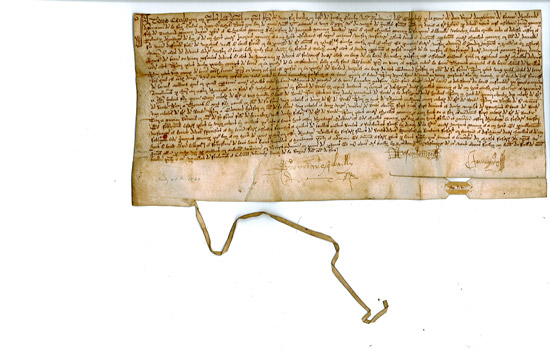RIT librarian translates long-lost document
Hospitality professor connects family with university translation and genealogy expert
Photo provided by the Wadsworth Family
Cataloging and metadata librarian Kira Barnes translated a long-lost document about a 16th century land transaction of Jean du Marescq, an ancestor of the Wadsworths, one of New York state’s oldest and prominent families.
Having skills in Middle French can come in handy at the most unexpected times.
For Kira Barnes, the skills were essential. She used them to translate a long-lost document about a 16th century land transaction of Jean du Marescq, an ancestor of the Wadsworths, one of New York state’s oldest and prominent families.
The documents and other artifacts were found in a trunk in the attic of the Wadsworth Homestead in Geneseo, N.Y. Calling upon a past relationship with RIT and David Crumb, a professor from the university’s hospitality program, Geneseo Town Supervisor William Wadsworth asked for help with the translation. Crumb recommended RIT’s library and archival staff. Barnes, cataloging and metadata librarian at RIT’s Wallace Center who is knowledgeable in language and manuscript translations, took on the project. The parchments are only slightly discolored, but the print was readable, she says.
“On the first reading, I just knew that a lot of land, and a lot of things were given from one person to another, but it was a bit of a mystery,” says Barnes, who has a master’s degree in French literature and studied the language and medieval manuscripts. “It looked like Middle French, which the French of that era would be. Although it is a little antiquated even for that, because it looks like it is Norman French. I had a little bit of expertise, but really not the expertise to make a good translation of the document. I consider this just enough to get the gist of it.”
The gist of the story is a large land transaction occurred between Jean du Marescq and Charles Gourrey, where the latter sold a house, adjacent property and holdings. The land, located on the Isle of Jersey in the English Channel, became his property on July 25, 1581, during the reign of Queen Elizabeth I. The documents are formal legal materials. They also relate the rights of several tenants on the lands and the payments to be received — bushels of salt, a valuable trading commodity at the time, Barnes explains.
It would be many years before the du Marescq and Wadsworth family trees would join, and members of the Wadsworth branch would travel across the Atlantic. The local family traces its ancestry in the United States to the American Revolution.
And in 2011, Crumb met with the current family leader, William Wadsworth. The two became acquainted when they worked with Crumb’s students in the class Real Estate for Hospitality in 2011. Over the quarter, the students worked with Wadsworth, researched his family, the homestead and the community to develop a plan for transitioning the home to a multiuse facility while still maintaining the historical essence of the home and surrounding land.
While the class ended, Wadsworth has since continued the transition. He came upon other family heirlooms and documents while going through the vast house. The du Marescq documents were only the most recent treasures discovered.
“The Wadsworth Homestead project has opened so many doors to the past. Kira Barnes’ translation is illuminating,” says Wadsworth. “Her findings make sense of genealogical documents that didn’t fit. It also shows how differently salt was valued 400 years ago.
“Through efforts like this we are getting a much clearer picture of a rich story that helps one connect to and feel the past. We are very thankful for the help we have received along the way and are gear to continue the valuable relationship with RIT.”
Barnes was not aware of the Wadsworth history until she was approached by Crumb to help with the translation. As a genealogy buff, she also became interested in this historical information and is eager to continue to refine the translation and learn more about the family history.
At RIT since 2004, Barnes is originally from Kansas City and has worked all over the country, including at the University of Nebraska.
“This is probably why I had not heard of the Wadsworths,” she adds. “I’m pleasantly surprised that somebody from the School of Hospitality was contacting me about a manuscript in French that someone had found in their attic. And I would love to go and see the house.”














